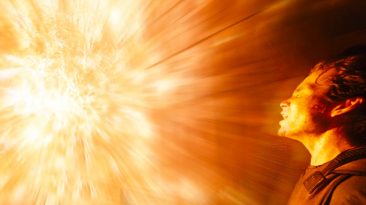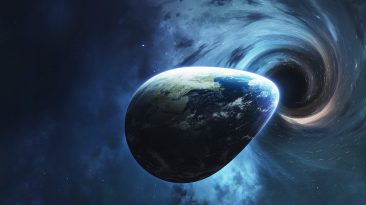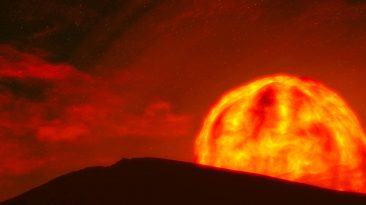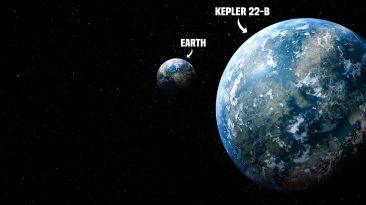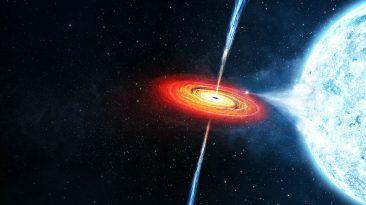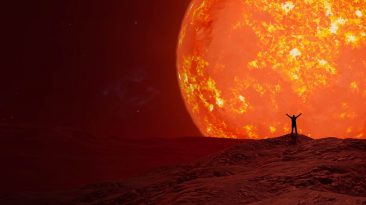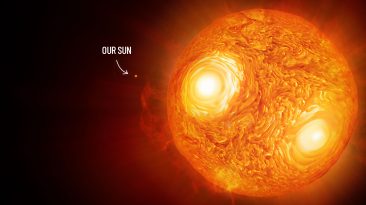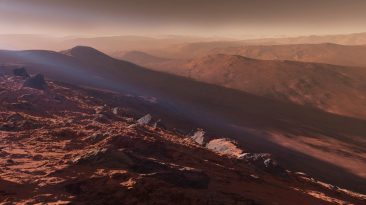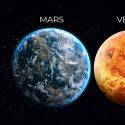Scientists have discovered many planets similar to Earth beyond our solar system. These exoplanets can be up to 10 times larger than Earth, which might be ideal for our growing population. But with more mass comes more gravity, and despite having more space for life, we’d be heavily affected in many ways on a Super Earth.
So, what would happen if we evolved on a bigger planet? What would life be like on a Super Earth? What are the risks? Could we survive as a species?
Imagine growing up on GJ 180 d, a Neptune-like exoplanet 7.5 times the mass of our Earth. This Super Earth is located in the “habitable zone,” orbiting a red dwarf star at a safe distance. One year on GJ 180 d lasts a mere 106 days, less than one third of a year on Earth. Your summers may be a little shorter on GJ 180d, but a week’s vacation would stretch a whole lot further than it would on Earth.
To live on a Super Earth would require super strength. If Earth were 10 times larger, gravity would be 10 times stronger. This is based on the formula of Surface Area = Mass/Radius squared. A short jog on a Super Earth would feel like running a marathon! The stress on our muscles and bones would increase by a factor of 10. At the very least, you could cut down on your reps when you workout!
Technically, our skeletons can withstand a force more than 90 times that of the Earth’s gravity, but only when standing still. With much more force pulling us down, our organs would shift and we’d likely develop some serious health issues, and an unavoidable paunch. Perhaps a little Super Earth yoga might help!
Our atmosphere here on Earth is held together by gravity. At sea level, atmospheric pressure is around one atmospheric unit. But at higher altitudes, like the peak of Mount Everest, the pressure is much lower, approximately 0.33 atmospheric units, because it is further from the Earth’s core. We don’t notice this pressure very much, but the air we breathe would feel much heavier on a Super Earth.
Just as air pressure changes with gravity, our water would also be affected. With more air pressure, water would take longer to boil and freeze. This is because it would require more energy for water molecules to evaporate or solidify into a heavier atmosphere. Prepare to wait much longer for your instant noodles!
Although we might be able to survive in these heavier conditions, the gravity of this Super Earth situation is much more dangerous than you might think.
Earth’s gravity helps keep our magnetic field intact. The movement of liquid iron (Fe) in our outer core generates this magnetic field, which protects us from harmful solar radiation. On a Super Earth, higher gravitational pressure might cause a solid inner core. No liquid movement of iron would mean no magnetic shield, and we’d be at risk of severe radiation exposure. We may need to wear protective suits or build sheltered walkways just to be outside.
This solar radiation could knock out power grids, meaning we’d have to innovate new ways of transferring electricity. And with a drastically weakened ozone layer, our risk of getting certain environmental cancers would seriously increase.
But that isn’t even the biggest problem! With a greater gravitational pull, we’d be attracting more unwanted objects from space. The likelihood of meteors and asteroids striking us would be much higher. Take Jupiter, for example. With 2.5 times Earth’s gravity, it gets hit up to 60 times a year by objects ranging anywhere from 5 to 20 meters (16.5-65 feet) in diameter. In 2009, it was struck by a whopping 500 meter (1,650 ft) asteroid!
The size of a giant asteroid hitting a Super Earth would be important, but also, where might it land? Sixty-six million years ago, an asteroid collided with Earth in a carbon-rich area, causing organic matter in rocks to be heated and ejected into the atmosphere and forming soot in the stratosphere.
This triggered drastic climate cooling which led to the mass extinction of dinosaurs. As a result, mammals evolved. If this asteroid had landed somewhere else, maybe there could still be dinosaurs roaming around today!
A similar global annihilation is very probable on a Super Earth. For humans to survive and evolve on a planet like this, we would have to be very lucky.
So, what if we needed to leave this Super Earth to avoid a disaster? Well, our space program would need a much bigger budget. More gravity to contend with would mean a lot more fuel to get anywhere. For a rocket carrying a payload of over 40,000 kg (45 tons), similar to the one used on the Apollo moon mission, the fuel required would cause the rocket to weigh over 360,000,000 kg (400,000 tons). This would be like trying to launch the Empire State Building!
One Polish mathematician suggested another solution, nuclear pulse propulsion. For this, an unmanned probe carrying dozens to several hundred nuclear bombs would fly alongside a rocket. Detonating these bombs at close intervals would help push the rocket upward. This is pretty risky though, especially if the probe misfires in our direction!
To put it simply, if we lived on a Super Earth, we might be stuck there for a while. We’d probably be better off just exploring space with telescopes from the Super Earth’s surface! Even though gravity might keep us down, it’s an essential component of life. And radically increasing gravity brings up many more questions to explore, like what if our seabeds sank deeper here on Earth?
Sources
- “Exoplanet discoveries include two super-Earths that could support life”. 2020. Digital Trends.
- “Exoplanet Exploration: Planets Beyond Our Solar System”. 2020. Exoplanet Exploration: Planets Beyond Our Solar System.
- “Planetary Fact Sheet”. 2020. nssdc.gsfc.nasa.Ggov.
- “Newly Discovered Exoplanet Trio Could Unravel The Mysteries Of Super-Earth Formation”. Daniel Clery, 2019. Science | AAAS.
- “What Is A Super Earth? – Universe Today”. 2014. Universe Today.
- “Barometric pressures at extreme altitudes on Mt. Everest: physiological significance”. Journal Of Applied Physiology 54 (5): 1188-1194. doi:10.1152/jappl.1983.54.5.1188.
- “Effects Of Gravity On The Body”. 2020. evolutionhealth.com.












